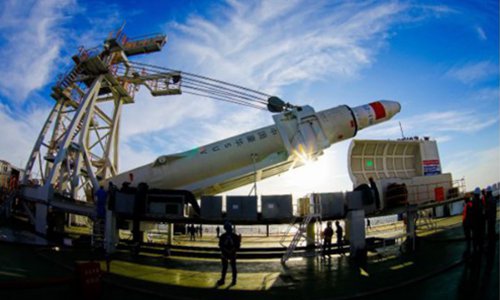HOME >> SCI-TECH
Carrier rocket’s sea launch safer, cheaper: experts
By Xu Keyue Source:Global Times Published: 2019/6/5 17:45:59

Long March-11 carrier rocket. Photo: Courtesy of the China Aerospace Science and Technology Corporation's China Academy of Launch Vehicle Technology
Despite a complicated marine environment, China successfully launched a Long March-11 carrier rocket at sea for the first time on Wednesday, which experts hailed as a safer and more economical way of rocket launch.
The rocket blasted off from a platform on a large semi-submersible barge in the Yellow Sea, media reported, noting that it also successfully sent two technology experiment satellites and five commercial satellites into a preset orbit.
This launch marks the first time for China to combine aerospace and marine technology, achieving a breakthrough in the safety, stability and reliability of launching at sea.
The rocket was named "CZ-11 WEY" by the China Academy of Launch Vehicle Technology, China Space Foundation and a Chinese automobile producer, the Xinhua News Agency reported.
Though rare, launching at sea has many advantages, like being far from densely populated areas, Jiao Weixin, a Peking University space science professor, told the Global Times on Wednesday.
To launch a rocket from the sea makes the launch point selection more flexible and can ensure the safety of the launch site and rocket debris falling area, Jiao said.
But the sea launch was much more difficult, Jiao said. For example, ocean waves and strong winds required a higher stability for the launch platform. Unlike land-based launches with complete support facilities, shipping fuel to the sea launch site was more difficult. And humidity and fog also created challenges for the launch, Jiao said.
He also noted that the Yellow Sea is suitable for the launch. The closer to the equator a rocket launch gets, the greater the speed boost it will receive. It reduces the amount of energy required to get into space, which means less fuel consumption, Jiao said.
The seaborne launch technology will meet the growing launch demand of low inclination satellites and help China provide launch services for countries participating in the Belt and Road Initiative, Xinhua quoted experts as saying.
The two satellites, developed by the China Academy of Space Technology, are expected to improve weather monitoring of ocean wind fields and weather forecasts in China.
A number of countries, including the US, Russia and Italy, have been experiencing difficulty developing sea-based launches for more than 50 years.
Newspaper headline: China achieves rocket sea launch
Posted in: AIR & SPACE